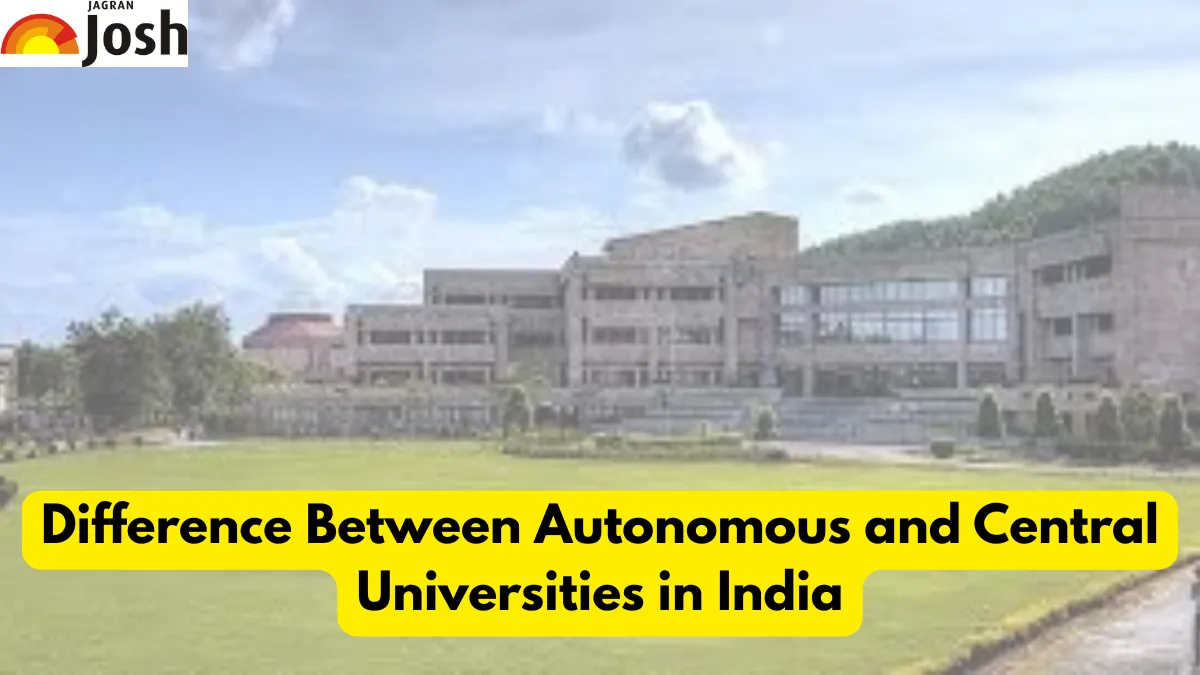Difference Between Autonomous and Central Universities: Autonomous and Central Universities in India: India's higher education system is very diverse, with many different kinds of institutions that are mostly identified by their funding, governance, and level of academic independence. Central Universities and Autonomous Status institutions are among the most well-known. Students, legislators, and other educational stakeholders must comprehend the basic distinction between these two groups. The distinction has a significant impact on the flexibility of the curriculum, the testing procedure, and the entire educational environment; it is not just administrative.
Central Universities have a national character and a mandate for excellence across a variety of academic subjects, which frequently results in better resources and research concentration. They were founded by an Act of Parliament and are directly and fully supported by the Central Government of India. On the other hand, the University Grants Commission (UGC) has granted academic freedom to an institution with Autonomous Status, which is typically a college but can also be a university.
Even though they may continue to be associated with a parent university (which, in the case of autonomous colleges, finally grants the final degree), this autonomy enables them to create their own curricula, administer independent tests, and offer cutting-edge courses. This disparity draws attention to a major conflict within the Indian system: centralized funding and mandate versus decentralized academic innovation and responsiveness.
Autonomous and Central Universities: key Differences
In India, the establishment, funding, and degree-granting power of an Autonomous College (or Institute) and a Central University are the main distinctions between the two.
| Feature | Central University | Autonomous College/Institute |
| Establishment | Established by an Act of Parliament of India. | An affiliated college granted Autonomous Status by the UGC. |
| Funding Source | Fully funded by the Central Government of India. | May be government-aided, partially aided, or private, but generally receives less direct/full Central funding than a Central University. |
| Degree Awarding | Has the authority to award its own degree in its own name. | The degree is formally awarded by the parent (Affiliating) University, though the college manages the curriculum and examinations. |
| Governance | Directly accountable to the Ministry of Education, GOI, and governed by its own Act. | Governed by its own statutory bodies (like the Governing Body and Academic Council) with oversight from the parent university and the UGC. |
| Academic Freedom | High level of academic autonomy (design curriculum, conduct exams). | High level of academic autonomy over curriculum design, teaching methods, and internal examination procedures. |
| Scope/Status | A full-fledged University with a national mandate for research and education. | A College that gains academic self-governance while retaining its affiliation status. |
Autonomous and Central Universities: Eligibility
-
Central University Undergraduate Admission: Passing the Common University Entrance Test (CUET) is a requirement for admission to the majority of Central University undergraduate programs. The minimal 12th standard score, usually between 50 and 60 percent, must be met by the students.
-
Admissions to Autonomous institutions: Autonomous institutions are permitted to establish their own admissions policies. Class 12 merit is typically used for admission, while marks from state-level or national entrance tests like CUET may also be used.
-
Central University PG/Research Entry: A qualifying degree and a discipline-specific national entrance exam (such as CUET-PG, NET, or GATE) are typically prerequisites for postgraduate (PG) and research programs at Central Universities.
-
Curriculum Eligibility for Autonomous Colleges: Because autonomous status gives colleges the freedom to create their own curricula and syllabi, they may have different prior courses or topic requirements than their parent institution.
-
UGC Requirements for Autonomous Status: A college must be NAAC accredited with a minimum 'A' grade, have been in operation for ten years, and consistently demonstrate high student enrollment and pass rates in order to be granted autonomy.
Also Check:
-
SATHEE Initiative by IIT Kanpur & MoE Launches 45-Day JEE Mains 2025 Crash Course
-
NEET PG 2025 Rank-wise Seat Allotment: Check Branch-wise Expected Closing Ranks
-
10 College Degrees Losing Value, According to Harvard – Better Alternatives to Study
Also Read:
Top IIT Colleges That Offer Data Science Courses to Learn Online in 2025
Best Free AI Courses for Beginners in 2025
Best Pharmacy Colleges in India 2025 After 12th Offering High Job Placement
To stay updated on current trends, join the Jagran Josh Telegram Community!
